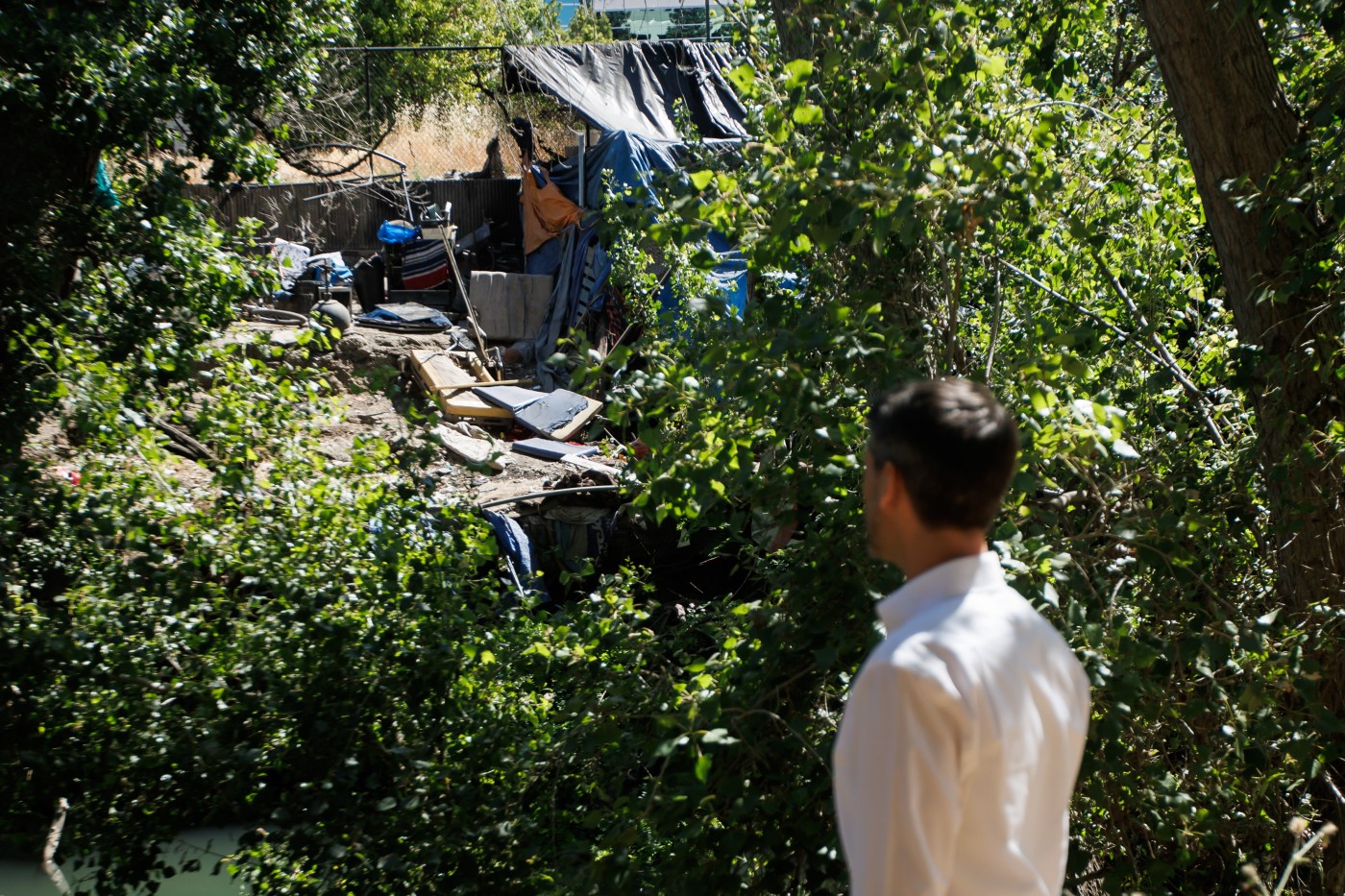Despite hours of spirited discussion and concerns raised by Santa Clara County officials, the San Jose City Council signed off Tuesday on Mayor Matt Mahan’s controversial proposal to cite and arrest homeless residents who repeatedly refuse shelter.
Related Articles
Letters: National Guard deployment in Los Angeles threatens rights of all
City Council strikes down San Jose mayor’s pay-for-performance proposal
Mayors of California’s largest cities warn that funding loss will set back homelessness progress
Berkeley moves to clear one of its largest homeless camps before judge halts sweep
Neighborhood leaders rally behind San Jose homeless arrest proposal
As San Jose prepares to increase its shelter capacity by more than 1,400 placements this year, the new policy will incorporate the expectation of accepting shelter into the city’s code of conduct for encampments, though the proposal offers some discretion when it may not be appropriate.
With the city making a significant investment in reducing homelessness, the majority of the City Council agreed that it was unacceptable for so many people to be living on the streets and that the proposal struck the right balance between compassion and accountability.
“These investments today reduce strain on our public service systems and deliver better outcomes at lower long-term cost,” Vice Mayor Pam Foley said. “San Jose residents have shown tremendous compassion, but they’ve also entrusted us with millions of their hard-earned tax dollars. They deserve to see the results.”
As part of his March budget message, Mahan unveiled the first version of the Responsibility to Shelter initiative, which initially sought to amend the city code to allow citations or arrests of unhoused residents for trespassing if they refused offers of available shelter three or more times over an 18-month period.
Mahan said the mere refusal of shelter was not a crime but instead “a signal of a problem.”
While the core concepts remain intact, Mahan pivoted the approach to amend the code of conduct for encampments and acknowledged the need for greater discretion to be built into the policy.
Mahan said the ultimate goal was to petition behavioral health courts to mandate treatment if someone has underlying mental health issues or is in the throes of addiction that impacts their ability to leave the streets.
To implement the new rules, San Jose is bringing outreach services in-house to give the city a better understanding of what is being offered and how unhoused residents are responding. It is also diverting existing police resources to create a new unit — staffed with one sergeant and six officers — to handle quality-of-life crimes and enforce the new policy when outreach efforts have failed.
The city also has discussed placing residents in facilities that focus on rehabilitation, such as the Mission Street Recovery Station, as an alternative to jail.
“When we take a place-based approach, it’s really important when, over the community’s objections, we build new solutions to homelessness in a neighborhood that we just don’t resolve 60 or 70 or 80% of the homelessness … but that we have a pathway and a solution for 100% of the people encamped in the vicinity of that site,” Mahan said. “This is focusing on the group that so often we ignore and allow to continue to persist with severe addiction and mental illness on our streets.”
Over the past few months, the proposal has elicited fierce opposition from county officials and nonprofit providers, who claimed the proposal amounted to criminalizing homelessness. In a letter to the City Council last month, Board of Supervisors President Otto Lee, District Attorney Jeff Rosen, County Executive James Williams, and Sheriff Robert Jonsen stated that the policy would result in “unnecessary and ineffective bookings” and divert already strained public safety resources.
Despite the county’s objections, a majority of residents and businesses have voiced support for the proposal, noting how some encampments and repeated encounters with unhoused residents have negatively impacted them.
The unions representing the city’s public safety departments also support the initiative, asserting that the homelessness crisis has forced them to respond to a large number of calls for service.
Between January 2023 and April 2025, the police received 44,593 calls, accounting for 6.93% of the citywide total.
District 5 Councilmember Peter Ortiz and District 2 Councilmember Pamela Campos issued the only two dissenting votes.
Ortiz said unhoused residents have ample reasons to deny shelter and that a one-size-fits-all policy could unjustly penalize them.
Campos also warned that the new policy would result in a “detour back to streets,” noting that Mission Street Recovery Station could only hold a person for 24 hours and did not offer housing.
“The council and the public must understand how everything will work together, and so I want to caution the approach that we are choosing to take where we are placing a huge amount of burden on an individual and framing it as a choice when the real culprit is a system that pushes people experiencing poverty into homelessness,” Campos said.
While Mahan acknowledged that the policy was imperfect and not a panacea for solving the homelessness crisis, he said it was essential to consider the scale at which mental health and addiction issues were impacting people on the streets.
“I don’t think it’s humane or compassionate to allow people to live and die on our streets when they are unable or unwilling to accept the help the city is able to offer, which is interim housing,” Mahan said. “That is not a signal that we should move along and allow people to exercise their civil liberties to camp but that we should instead double down and engage and intervene to save lives, to yes, force the issue, because members of the recovery community will tell you, there is no recovery without accountability.”





